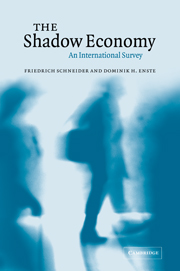Book contents
- Frontmatter
- Contents
- List of figures
- List of tables
- Foreword by Vito Tanzi
- 1 The shadow economy: a challenge for economic and social policy
- 2 Defining the shadow economy
- 3 Methods to estimate the size of the shadow economy
- 4 Size of shadow economies around the world
- 5 The size of the shadow economy labour force
- 6 An integrated approach to explain deviant behaviour
- 7 Analysing the causes and measures of economic policy
- 8 Effects of the increasing shadow economy
- 9 The ‘two-pillar strategy’
- 10 Conclusion and outlook
- List of references
- Index
1 - The shadow economy: a challenge for economic and social policy
Published online by Cambridge University Press: 13 July 2009
- Frontmatter
- Contents
- List of figures
- List of tables
- Foreword by Vito Tanzi
- 1 The shadow economy: a challenge for economic and social policy
- 2 Defining the shadow economy
- 3 Methods to estimate the size of the shadow economy
- 4 Size of shadow economies around the world
- 5 The size of the shadow economy labour force
- 6 An integrated approach to explain deviant behaviour
- 7 Analysing the causes and measures of economic policy
- 8 Effects of the increasing shadow economy
- 9 The ‘two-pillar strategy’
- 10 Conclusion and outlook
- List of references
- Index
Summary
In the eighties, the causes, effects, and problems generated by increasing shadow economic activities were extensively and controversially discussed in countries belonging to the Organization for Economic Cooperation and Development (OECD). Now, once again, attention is being drawn to the shadow economy because of dramatically rising unemployment (e.g., in the European Union) and the problems of financing public expenditure, as well as the rising anxiety and disappointment about economic and social policies. Public discussion of illicit work, tax evasion, and all the other activities in the shadow economy has grown increasingly pointed. Broad initiatives on behalf of the EU Commission and EU Parliament, as well as at state-level, show that politicians have finally felt the need to act as well.
Politicians are in a dilemma. While the fact that the wealthy are evading taxes leads to widespread public indignation, illicit workers are often much less criticised, although some politicians argue that they are behaving antisocially and are a source of growing unemployment and social injustice. This opinion is broadly shared in regard to social fraud, illegal employment, and extensive tax evasion. But what about part-time illicit work in the evening (‘moonlighting’) which, for example, about half of the population in Germany would tolerate, or even take advantage of, if they had the opportunity to make use of it? Can more sanctions and controls, combined with more regulation, be the ultimate solution to combat illicit work? What is the right way to deal with undeclared work?
- Type
- Chapter
- Information
- The Shadow EconomyAn International Survey, pp. 1 - 5Publisher: Cambridge University PressPrint publication year: 2003



